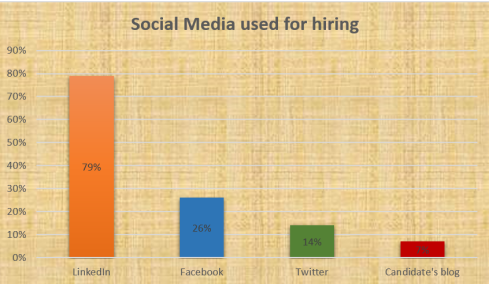There has always been the argument that validating an applicant’s suitability based on their social media is obtrusive. (1) However in this present-day where the use of the internet and social media is becoming more transparent, it is no wonder having an outstanding digital profile is so important. A shocking number of employers, 73% has hired a candidate through the social media.

With 93% of them reviewing the applicant’s social profile before making the final hiring decision. (2) From these numbers, it can be said that the traditional paper resume and CVs is no longer sufficient but also being able to showcase ourselves professionally on the web is crucial.
So how can we do this?
Be true to yourself

A person’s individuality is what sets them apart from the rest. No one in the world is exactly like another and that makes them one-of-a-kind. Being true to one’s character and what they are capable of is actually the most important part of their digital profile. People have a tendency to imitate their traits or build a fake persona, but this only makes it harder to gain the trust of others since it will be unnatural. (3) One’s digital profile should be their clearest reflection because people choose to work with others because of who they are.
Avoid content that brings a negative impact
To create a desirable online profile, one has to steer clear of negative content that would undermine their reputation. You may be cautious in whatever you post but even a simple photo tagged by friends can impact your face value. With social media becoming more widely used, the lines are starting to blur between personal and public.

Imagine a boss seeing such a picture of his employee after a night of drinking, I’m certain it would create an unforgettable impression.
Consistency in efforts
Rome wasn’t built in a day and so is trust. To develop a trustworthy online profile, consistency is key. Creating a presentable online profile is just the first step, maintenance is where it all matters. I have to admit that for my personal LinkedIn account, after the creation of my profile; updating it is the last thing on my mind. Other than the routine update of achievements, continuous efforts in sharing articles, engaging in network discussions and participating in events also play a part. (4) These efforts would accumulate to build a profile that portrays genuine passion and character.
Grasping these points will enable you to build a robust digital profile while remaining true to yourself.
Reference:
- http://www.telegraph.co.uk/education/universityeducation/student-life/11359730/How-to-use-social-media-to-get-a-graduate-job.html
- https://www.jobvite.com/wp-content/uploads/2014/10/Jobvite_SocialRecruiting_Survey2014.pdf
- http://www.theemployable.com/index.php/2014/10/28/blogging-can-help-get-job/
- https://www.roberthalf.com.au/blog/how-build-professional-digital-profile

Hey Eugene!
It is interesting yet a bit scary that almost all recruiters do social profiling! After reading your post (and many other of our classmates’) I went onto my LinkedIn to do some updates which I have left untouched from TWO YEARS ago! 😅
I came across this survey (http://www.socialtalent.co/blog/the-2016-global-recruiting-survey-free-download) and in it they pointed out that social media sourcing is not as efficient as we might think. With 72% of search results are irrelevant (profiles were viewed and discarded),72% of candidates never respond to companies and 73% of the respondents say “no” or aren’t suitable for the job.
I feel that it takes two hands to clap; the recruiters and job-seekers have a role to play for e-recruitment to be effective. Perhaps a clearer description of job vacancies posted will reduce the number of No’s? Or maybe a better mutual understanding of what both parties want? What do you think?
LikeLike